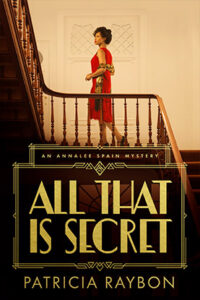 Patricia Raybon is an award-winning author and essayist whose books include My First White Friend, a Christopher Award–winning memoir about racial forgiveness, and I Told the Mountain to Move, a prayer memoir that was a Christianity Today Book of the Year finalist. Patricia’s other books include The One Year God’s Great Blessings Devotional and Undivided: A Muslim Daughter, Her Christian Mother, Their Path to Peace, coauthored with her younger daughter, Alana Raybon.
Patricia Raybon is an award-winning author and essayist whose books include My First White Friend, a Christopher Award–winning memoir about racial forgiveness, and I Told the Mountain to Move, a prayer memoir that was a Christianity Today Book of the Year finalist. Patricia’s other books include The One Year God’s Great Blessings Devotional and Undivided: A Muslim Daughter, Her Christian Mother, Their Path to Peace, coauthored with her younger daughter, Alana Raybon.
Patricia’s essays on faith, race, and grace have been published in the New York Times, Newsweek, USA Today, Guideposts, Christianity Today, and other national publications and blogs.
She lives with her husband, Dan, in her home state of Colorado.
. . .
You’ve written a number of books, but this is your first novel. How was your writing process different for fiction?
It’s extraordinary fun. I found it exciting—in a fresh way. I’ve been reading about fiction writing throughout my nonfiction career. I admire the fiction format and always wanted to learn how to plot a novel. So during the pandemic summer of 2020, I sat myself down on my back deck and reread everything I could find on fiction writing—Robert McKee’s wonderful screenwriter’s “bible” titled Story, James Scott Bell’s books on structuring the novel, John Truby on The Anatomy of Story, G. K. Chesterton’s classic reflection on “How to Write a Detective Story,” Sol Stein’s Stein on Writing, plus countless articles and essays on understanding story beats in romance and thriller plots.
One big surprise and difference: writing fiction demands bottomless courage—both for the writer and the characters. First, I was censoring myself—saying, “Nope, you can’t write that” or “You can’t say that.” But the more risks I took with the characters, their stories, and the writing itself, the more compelling, I believe, the overall story became.
Another joy: my characters kept surprising me—showing up on the page when I hadn’t yet met them, doing things I hadn’t planned, revealing things I didn’t see coming. Writing my story was like watching a movie with plot twists. My husband, Dan, would hear me in my office suddenly yell out, “Guess what happened!” I truly loved the writing process. My only regret is not turning seriously to fiction decades ago. My consolation is knowing that age and life experience should make me a better novelist. I sure pray so.
The Author and Creator of our lives often writes in a twist that ultimately blesses us more than our original plan. Have you ever experienced such a “Divine Detour”?
It’s hard to talk about, but I lost a high-profile newspaper job in my late thirties—the worst career downfall I’ve ever experienced. But it turned out to be one of the best things that ever happened to me. That low point led me to a high calling, my next position—teaching newspaper reporting and editing to eager graduate and undergraduate students on a large university campus.
There I was forced to dig deep—to stir in my soul enough humility to learn how to teach and teach well. That meant I was forced to listen, but also to learn empathy, patience, clarity, order, dignity, self-control, prudence, integrity, passion—and to change lives while God changed mine.
I still thank God for allowing that unexpected journey, for turning what appeared to be bad into something far better than I ever imagined. It even forced me to learn public speaking—something I thought I hated. I also learned to lead and facilitate workshops and seminars, all skills I routinely use in my life now as a Christian author.
I couldn’t see any good, at first, in the bad. Most of us can’t. But today, if you’re smack in the middle of one of life’s curveballs, catch it. Then bless God’s Spirit by thanking Him for sending it your way.
 Let’s talk about your new book, All That Is Secret (October 2021, Tyndale House). Please tell us about it.
Let’s talk about your new book, All That Is Secret (October 2021, Tyndale House). Please tell us about it.
It’s a 1920s historical mystery about a young Black theologian—and Sherlock fan—trying to solve her father’s cold case murder when Denver and all of Colorado are ruled by the KKK.
The story itself opens in the winter of 1923 when Professor Annalee Spain—a clever but overworked theologian at a small Chicago Bible college—receives a cryptic telegram calling her home to Denver to solve the mystery of her beloved but estranged father’s murder.
For a young Black woman, searching for answers in a city ruled by the KKK could mean real danger. Still, with her literary hero Sherlock Holmes as inspiration, Annalee launches her hunt for clues, attracting two surprising allies: Eddie, a relentless young orphan boy searching for his missing father, and Jack, a handsome pastor who loves nightclub dancing and rides in his sporty car, awakening Annalee’s heart to the surprising highs and lows of love.
With their help, Annalee follows clues that land her among Denver’s powerful elite. But when their sleuthing unravels sinister motives and deep secrets, Annalee confronts dangerous truths that could make her a victim, too.
What inspired you to write this particular story?
I love clergy mysteries—Father Brown by G. K. Chesterton, the vicar of Grantchester, and the like. My hope was to introduce a character wrestling with faith into the crucible of a mystery, complicated by two additional things—race and a sometimes-rocky new relationship. Second, I wanted the setting to be Colorado, a beautiful “sunshine” place—but during one of its darkest times, the 1920s. The character who emerged to find her place in that world was young Professor Annalee Spain. Once I “met” her, her story literally took off. My job was to get cracking, keep up, and tell her story.
What do you hope readers will take away from it?
A bigger heart. In fact, if I’m honest, I want readers to discover, as I did, that by experiencing a young, clever Black woman as fully dimensional, we open our hearts more to hidden aspects of ourselves. Life is rough-and-tumble. It can hit overdrive when family and secrets and race and love collide. But a tough, smart cookie can work on life’s mysteries and find answers—about herself and others—and then find the courage to tackle another puzzling problem again. I’m excited that readers will join me in following Annalee’s journey down that road. Together, we’ll discover more to unravel in her world and also in our own.
A few fun questions . . .
When the words aren’t flowing—or when you want to celebrate if they are—what is your favorite comfort food and why?
Popcorn! I love the crunch. Pizza! I love spicy sauce, fresh basil, and a perfect crust. Yum!
What Bible passage or story best describes your journey of faith?
For I am not ashamed of the gospel of Christ: for it is the power of God unto salvation to every one that believeth. ~ Romans 1:16, KJV
I aim to walk in this Scripture—even in secular settings. Once, during my university teaching job, I was strongly asked not to mention my faith in a Diversity Day speech. So I started by saying I was asked not to mention my faith for Diversity Day. But if the audience didn’t mind, I’d start with a Bible story. (Everybody laughed.)
I shared the “let down your nets” story in Luke 5 when Peter and the other disciples, after fishing all night with little to show, obeyed Jesus and let down their nets on the other side, for a greater catch.
It was a great metaphor for how the campus could achieve greater student diversity. Stop fishing in old, dead, cold, empty waters. Let down your nets somewhere else.
That speech got a standing ovation! (Afterward, a man thanked me, telling me, “In fact, there are no secular situations. Every place is sacred.”) So I can’t imagine denying Christ for any reason. This Scripture passage best defines that choice and journey, and I’m continually convicted by it and glad for it!
In the story that is your life, are you the strong female lead; the girl next door; the mysterious woman behind dark glasses; the superheroine; or the little girl trying to walk in high heels?
All of the above? Truthfully, that’s my answer because I can see myself in all of those categories depending on the situation. As a woman of color in a sometimes-hostile culture, I’ve had to wear different hats, coats, dresses, pants, and shoes—from sneakers to high heels to hiking boots!
More than all, I think of myself as Bill and Nannie’s daughter—those are my late parents—who taught me to love like Jesus and read the room. So with God’s help, I can be a lot of things depending on what people are looking for in a woman like me.
Most of all, like Jesus, I learned from my parents how to meet people where they are—while inviting them to see the world, and people like me, in a deeper way. May God help me every step of that journey.
Thanks, Patricia! It’s nice to have you as a guest at Divine Detour.
~ ~ ~
For more information about Patricia, visit her website and/or on Facebook, Twitter and/or Instagram.
To order All That Is Secret, log on to:
